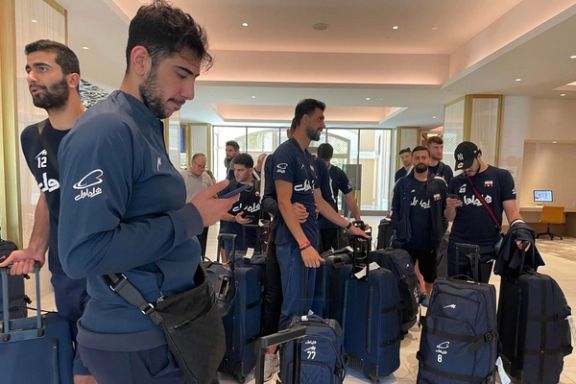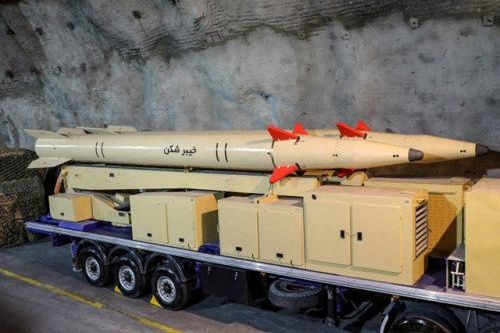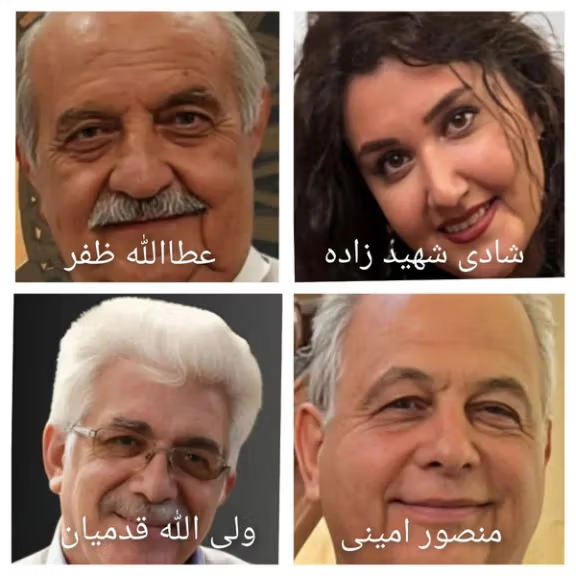US Issues Visas To Iranian Delegates While Volleyball Players Denied

Key players and coaches from Iran's national volleyball team have been denied US visas while bureaucrats continue to travel.

Key players and coaches from Iran's national volleyball team have been denied US visas while bureaucrats continue to travel.
The US State Department mysteriously refused the visas for the latest round of the Volleyball Nations League in California, while a long list of officials accompanying the team in the US were granted the visas.
The visit has sparked controversy in Tehran, where the Iranian public are funding bureaucrats' travel at the expense of key athletes.
Iran's national team arrived in Anaheim, California, a few days ago without its head coach Behrouz Ataei and several key players including Amin Emsaeilnejad and Mohammad-Taher Vadi. Meanwhile, the federation's public relations officer, vice-president, secretary and treasurer had been granted entry.
Milad Taghavi, the secretary of the federation and one of those initially denied a visa, called for boycotting the tournament because of the issue but finally ended up in California, according to Iran's state-run Mehr News Agency.
The Iranian website Tabnak has criticized the Iranian volleyball federation for giving a list of 60 people to the US embassy in Ankara and sending several officials to California

France, Britain and Germany are discussing how to deal with the approaching expiration of European Union sanctions against the Islamic Republic's ballistic missile program.
Speaking exclusively to Iran International, German Foreign Ministry Spokesperson Christian Wagner said: "We are in touch with our E3 partners [France and Britain] on how to deal with the issue of Iran," when asked about the possible extension of sanctions on Iran's ballistic missile program.
Set to expire in October under the 2015 nuclear deal, the sanctions have as yet failed to stall Iran's nuclear progress. Wagner said the Islamic Republic has developed its nuclear program in recent months in violation of its commitment under the Joint Comprehensive Plan of Action (JCPOA).
"As parties to the JCPOA and according to the UN Security Council Resolution (2231 which endorsed the JCPOA), we have commitments to respect," he added.
In his interview with Iran International, the German foreign ministry spokesman stressed that the E3 countries are discussing "what action to take" regarding the expiration of sanctions against Iran's ballistic missile program as time is running out.
European diplomats are lobbying to retain the sanctions, not only for the advancement of Iran's nuclear program but also for Iran's continued arming of Russia's war on Ukraine.

A Revolutionary Court in Tehran has sentenced four members of Iran's Baha'i community to a total of 20 years in prison.
The court has given five-year jail terms to Shadi Shahidzadeh, Mansour Amini, Valiollah Qadamian, and Ataollah Zafar, the US-based Human Rights Activists News Agency (HRANA) reported on Wednesday.
Notorious judge Iman Afshari, who is under international sanctions over human rights violations, convicted the four Baha'i of "joining illegal groups with the purpose of disrupting the country's security", following a trial held on May 31.
The Court had earlier rejected a request to release the four on bail following their arrest on May 1.
Shahidzadeh is the granddaughter of Ezzat Zarghami whose dead body was kept in a morgue for 31 days after the Intelligence Ministry prevented his family from holding a funeral for him, and was finally buried secretly.
The three others - who are reportedly suffering from underlying health conditions - were also staff members of the cemetery of Tehran's Baha'i community.
Sources earlier told Radio Farda that the Intelligence Ministry had taken the four Baha'i hostage to force the minority group to bury their loved ones in the way Iran's regime wants.
Bahai’s, who number around 300,000 in Iran, are systematically persecuted, discriminated against, and harassed.
They cannot hold jobs and the public sector and have been released from their jobs in the private sector under pressure from authorities.

A comment by a leading Iranian reformist about the likelihood of boycotting the 2024 parliamentary elections has led to an intense war of words with hardliners.
Conservative heavyweight Mohammad Reza Bahonar triggered the political confrontation by threatening Iran's reformists that they would be treated as “outsiders” if they boycott the upcoming elections. This is a serious threat in the Islamic Republic’s political context.
Two days later, a prominent conservative figure, Bijan Moghaddam, who is close to Supreme Leader Ali Khamenei and the Revolutionary Guard, tried to smooth out Bahonar’s comment, under reformists pressure, saying that this was Bahonar’s own view and did not reflect the position of the ruling hardliners.

Bahonar had used the vernacular term "khavarej" about reformists if they boycott the elections. The word meaning outsiders, also means in the Iranian religious context "those who opposed Imam Ali," the first Imam of the Shiite sect who was eventually assassinated by khavarej (the Kharijites). The word is almost synonymous with heretics.
Bahonar had made the statement after reformist theoretician Saeed Hajjarian mentioned boycotting as one of the six possible reactions by reformist if hardliners prevent or restrict their right to run in the elections.
Hundreds of reformist candidates were banned in the 2020 parliamentary vote by the conservative Guardian Council loyal to Supreme Leader Ali Khamenei. The result was a very low-turnout election in which hardliners won a commanding majority in the legislature.

While they show little sign of giving reformists a fair chance in March 2024, there is talk of simply boycotting the vote. At the same time that hardliners want to continue their monopoly of power, they are concerned about another low-turnout elections that would further tarnish the image of the regime.
In his interview with Khabar Onlineon Monday, Moghaddam maintained that reformists' maneuvers indicate they are likely to boycott the election. He said in a tone milder than Bahonar's: "Calling for participation in the elections is essential for Iran's security and national interests."
Moghaddam also said, "Both the Supreme Leader and the people expect reformists to take part in the elections." Again, this was a threat milder and more diplomatic than Bahonar's.

However, speaking of the voters, many people have commented on social media that Iranians have said over and over during recent protests that they no longer trust the reformists or the conservatives, and what they want is in fact a regime change.
Earlier, Azar Mansoori, the leader of Iran's Reform Front, an umbrella organization consisting of several reformist parties and political groups, addressed Bahonar in a July 2 telling him that if he is concerned about low turnout, instead of threatening reformists he should tell his fellow conservatives to allow fair competition.
In another tweet on the same date, prominent Iranian sociologist Mohammad Fazeli wrote: "Such a threat…reveals a significant characteristic of Iranian politics today."
Hajjarian, a former intelligence operative, had made it clear in his statement that "as the current government does not want reformists' political participation, reformists may consider taking part in the elections only if President Raisi resigns or is ousted."
Moghaddam told Khabar Online that "statements against the elections by some politicians may be assessed as a threat against national security." He added: "When you put forward preconditions that cannot be met, you are obviously paving the way for boycotting the elections."
Former IRGC officer Ghorban Ali Salavatian wrote in a tweet on July 3, "Some of the conservatives cannot talk properly and in a timely manner. So, they shoot themselves in the foot like Mr. Bahonar who has threatened the reformists rather than trying to encourage them to take part in the elections. Referring to Bahonar's outdated rhetoric, another user wrote that "Individuals like Bahonar continue to live in the 1980s."
Another comment said "What you quoted was what Bahonar said directly. Indirectly, however, he was begging the Reformists to form a coalition with a group of conservatives including himself."

An Iranian proxy militia has taken an Israeli-Russian academic hostage in Iraq, Israeli Prime Minister Benjamin Netanyahu’s office says.
It does not yet appear that the Iran-backed Shiite group Kataib Hezbollah has made any negotiation demands for Elizabeth Tsurkov, who traveled to Iraq on her Russian passport to carry out research for her PhD studies in politics at Princeton University in the United States.
An expert on regional proxies across the Middle East including Turkey's proxies in Syria, she had traveled to several of the region's terror hotspots. Israel's Prime Minister's Office released a statement which confirmed Tsurkov is still alive, adding that the situation is being handled by the relevant bodies in Israel.
Tsurkov's mother Irena said they lost contact two months ago. "From what I had known until today, she was in Turkey, working on her research for Princeton. I didn't even know she was in Iraq," she told Israel's N12 News.
Tsurkov's Twitter page, which has nearly 80,000 followers, was last updated on March 21.
Israeli citizens are forbidden from travelling to Iraq — an enemy state where Kataib Hezbollah is one of the most powerful Iran-backed militia groups, with a history of attacking US targets in the area.

The Association of Families of Flight PS752 welcomed the move by Canada, Britain, Ukraine and Sweden to take the case to the International Court of Justice (ICJ).
“We independently filed our claim before the International Criminal Court and support the four affected countries’ referral to the International Court of Justice,” the Association said in a statement.
“Those who ordered and carried out the crime [involving] the Ukrainian airliner will not be left alone,” Javad Soleimani who lost his young wife Elnaz Nabii in the tragedy tweeted Wednesday and said suing the Islamic Republic was a very important step to attain justice for which the Association made great efforts.
“They murdered 177 innocent civilians, blatantly disrespected their remains, looted and robbed their belongings, lied for three days until they were exposed and continued to subvert justice, the Association of Families of Flight PS752 said in a statement Wednesday.
“The Islamic regime staged show trials at an unqualified and partial military tribunal to convict an unknown patsy for negligence and failure to obey orders, and sentenced him to ten years in prison,” the statement said and thanked the four countries and their legal team for “working steadfastly towards their commitment to truth and justice.”
Some of the victims’ families held a seminar in Toronto Wednesday entitled Flight PS752, Our Mission: Truth and Justice and said they would gather at the city’s Mel Lastman Square to remember the victims.

The Association’s statement was released after the announcement of the International Court of Justice (ICJ) on the same day that it received a joint application by Canada, Britain, Ukraine and Sweden which constitute the International Coordination and Response Group for the Victims of Flight PS752 against the Islamic Republic of Iran concerning the dispute over the downing of the flight on January 8, 2020 which killed all 177 onboard including an unborn child.
In a press release Wednesday, ICJ in the Hague, the principal judicial organ of the United Nations often referred to as the World Court, said the applicants claim that Iran has violated a series of obligations under the Montreal Convention because of the shooting down the civilian aircraft by military personnel of the Revolutionary Guards (IRGC) on January 8, 2020.
They also say Iran subsequently failed to conduct an impartial, transparent, and fair criminal investigation and prosecution consistent with international law.
“Iran must be held to account for their actions and we will continue to fight for the transparency, accountability and justice that victims' families deserve,” Canada’s minister of foreign affairs, Melanie Joly, tweeted after the announcement.
In a tweet Wednesday, UK ambassador to Tehran, Simon Shercliff, said the legal action reflects his country’s unwavering committed to achieving transparency, justice and accountability for the families of the victims.
Iran's hardliners have been comparing the incident with the downing of Flight IR655 on July 3, 1988, by the USS Vincennes. All 290 people onboard the Airbus were killed.
“With today marking the 33rd anniversary of the shooting down of the Iranian civilian airplane #IR655 which resulted in the death of 290 passengers and crew including 66 children, those who were shedding crocodile tears after the Ukrainian plane crash are nowhere to be seen,” a Twitter account bearing the name of Brigadier General Amir-Ali Hajizadeh, the Revolutionary Guards Aerospace Commander at the time of the incident, said on July 3.
Flying from Bandar Abbas in southern Iran towards Dubai, the UAE, IR655 was shot down during the Iran–Iraq War (1980-1988). The United States claimed the Vincennes crew had incorrectly identified the Airbus as an attacking Iranian Air Force F-14 Tomcat and that the airliner was targeted after ten attempts to contact the aircraft both on military and civilian frequencies to no avail.
US President Ronald Reagan sent a written diplomatic note to the Islamic republic shortly after the incident and expressed his deep regret for the shooting down of the plane and declared that reparations or compensation to the families of victims were "a matter that has to be discussed."